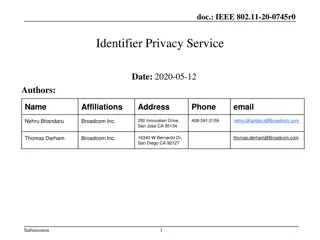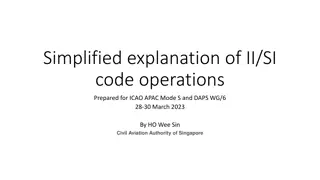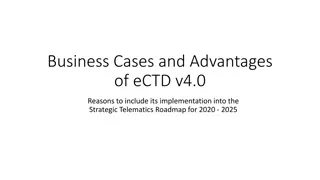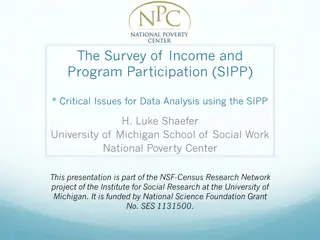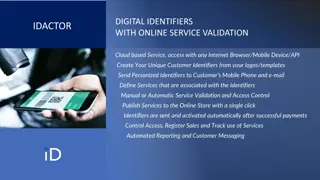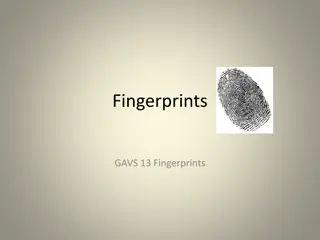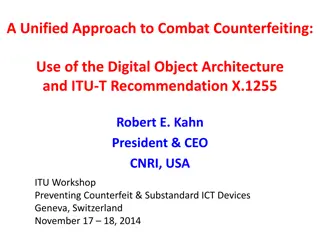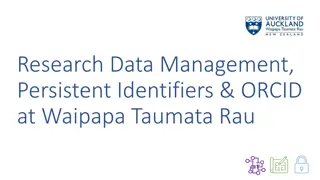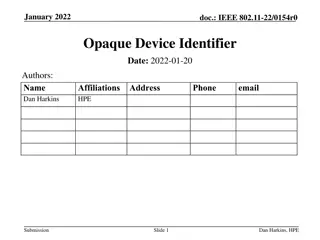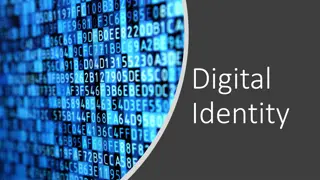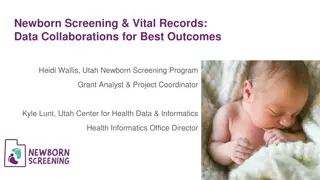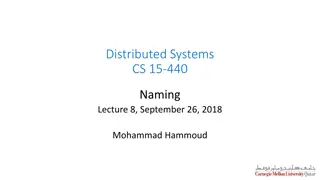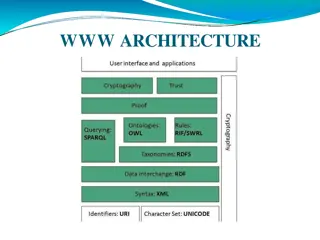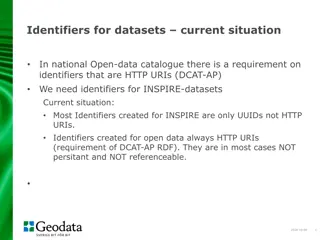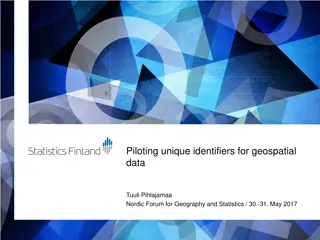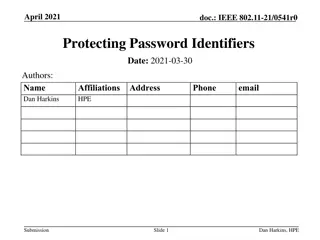Rwanda HIE Patient Identity Management System Overview
The Rwanda Health Information Exchange (HIE) system focuses on patient identity management to uniquely identify individuals seeking healthcare across the country. By maintaining a set of identifiers in the client registry and avoiding duplication of patient records, the system ensures efficient and
12 views • 8 slides
How to Find and Update QuickBooks License Number And Product Key
Finding and updating your QuickBooks license number and product key is essential for maintaining legal use of the software and ensuring access to updates and support from Intuit. The license number and product key are unique identifiers that authenticate your copy of QuickBooks. This guide will walk
1 views • 5 slides
Amateur Radio Licensing Regulations and Call Signs in the UK
Learn about the licensing regulations, privileges, call sign formats, secondary identifiers, and addresses for amateur radio operators in the UK. Discover the differences between Foundation, Intermediate, and Full license classes, as well as the various call sign formats used in England. Explore the
0 views • 87 slides
Fascinating Facts About Golden Eagles - Discover the Majesty of North America's Largest Bird of Prey
Learn intriguing details about golden eagles, including their lifespan, diet, wingspan, and key identifiers. Explore their habitat range, unique adaptations, and comparisons with other raptor species like bald eagles. Appreciate these magnificent birds as vital contributors to their ecosystems.
0 views • 7 slides
IEEE 802.11-20-0745r0 Identifier Privacy Service
In IEEE 802.11-20-0745r0, the focus is on protecting identifiers to enhance privacy in wireless networks. The proposal suggests using ECIES for identifier protection, covering various identifiers like password identifiers and PMKIDs. By implementing a scheme similar to 3GPP and IETF standards, the s
4 views • 7 slides
Federal Agencies Guidance on Ethics, Compliance, and Audit Services under NSPM-33
The White House OSTP released guidance for federal agencies to implement NSPM-33 focusing on disclosure requirements, digital identifiers, consequences for violations, information sharing, and research security programs. The guidance emphasizes supporting open scientific inquiry and nondiscriminator
0 views • 10 slides
Understanding Mode-S Radar Operations and Identifiers
This simplified explanation delves into the fundamental principles of radar operations, focusing on Primary and Secondary radar systems, including Mode A/C and Mode S functionalities. It covers radar interrogation, replies, and the significance of radar identifiers (II and SI codes) in managing over
0 views • 19 slides
Emerging Global Trends in IoT by Davis M. Onsakia
The Internet of Things (IoT) is a system where various devices, machines, and objects are interconnected with unique identifiers to transfer data without human interaction. This concept involves connecting devices to the internet or to each other, leading to improved efficiency, better customer serv
0 views • 26 slides
The Advantages of Implementing eCTD v4.0 into the Strategic Telematics Roadmap
eCTD v4.0 offers several benefits such as harmonized submission units, document re-use through unique identifiers, enhanced life cycle management, and controlled vocabularies for easier updates. It facilitates grouping of documents based on context of use and keywords, automates administrative proce
0 views • 13 slides
Guidelines for Managing IHO MRNs - High-Level Rules and Recommendations
Establishing guidelines for the management of International Hydrographic Organization (IHO) Maritime Resource Names (MRNs), including rules for unique identifiers, length specifications, and preservation throughout the object's lifetime. Considers the governance, management, and allocation of MRNs a
0 views • 17 slides
Analyzing Data Complexity in the Survey of Income and Program Participation (SIPP)
The presentation delves into critical issues in data analysis using the SIPP, emphasizing the importance of setting up a structured analysis plan in STATA. Key considerations include determining the unit of analysis, whether at an individual or household level, and how to identify sampling units usi
5 views • 22 slides
Utilising Standards & Tools for Electronic Single Window Implementation
This document discusses utilizing a service-oriented approach with world-class tools and standards for implementing an Electronic Single Window system at the WCO IT Conference 2015 in the Bahamas. It covers understanding the environment, establishing the vision for a National Single Window Solution,
0 views • 11 slides
Consultation on Proposal for a New Carers Census: Analysis by Julie Rintoul
This consultation received 36 responses from various organizations including Integrated Joint Boards, Carers Centres, and Local Authorities. Issues were raised regarding baseline data collection for carers, with a need for improved systems and definitions. Majority agreed on quarterly data collectio
0 views • 8 slides
Our Website Cricketonlinebook Offers Online Betting For Cricket Matches
Online Cricket ID are unique identifiers that users create on platforms like Cricketonlinebook to manage their betting activities. These IDs are essential for accessing features like placing bets, tracking winnings, and participating in various crick
0 views • 4 slides
Distributed Algorithms for Leader Election in Anonymous Systems
Distributed algorithms play a crucial role in leader election within anonymous systems where nodes lack unique identifiers. The content discusses the challenges and impossibility results of deterministic leader election in such systems. It explains synchronous and asynchronous distributed algorithms
2 views • 11 slides
Setting up and Running Postal Code Conversion File Plus (PCCF+) - Step-by-Step Guide
In this detailed guide prepared by Statistics Canada, you will learn how to set up and run the Postal Code Conversion File Plus (PCCF+). The process involves creating an input file with unique identifiers and postal codes, producing a new dataset, saving it for import, importing the data to SAS, tra
0 views • 21 slides
Streamlining Customer Service Management with Digital Identifiers
Revolutionize your customer service experience by leveraging cloud-based digital identifiers for unique customer identification, service validation, and access control. Seamlessly create, personalize, and send identifiers to customers via mobile and email, enabling automated service activation post-
0 views • 15 slides
Understanding Data Linkages for DaVINCI
Explore the intricacies of patient identifier linkages and linking methodologies for direct care data in the context of DaVINCI. Learn about different systems such as CHCS, AHLTA/CDR, MHS Genesis, and how they utilize identifiers like EDIPN, SSN, and more to establish unique patient records. Discove
0 views • 29 slides
Unveiling the Realities of Privacy in App Usage
Exploring the complexities of privacy policies, the disclosure of user data by apps, and the implications of mobile tracking. Learn how AppCensus assists parents in understanding app data collection practices and the risks associated with sharing persistent identifiers. Discover how third parties ut
0 views • 25 slides
Climate Research User Requirements and Product Specifications in Phase II SST CCI
User requirements for climate research in Phase II SST CCI were gathered through multiple methods including literature review, questionnaires, and workshops. These requirements were traced with unique identifiers and used to define product specifications for version 2.1 products in the Bridging Phas
0 views • 16 slides
Understanding Fingerprints and Their Role in Forensic Science
Fingerprints are unique identifiers left behind by individuals and play a crucial role in forensic investigations. This text delves into the science behind fingerprints, their composition, and how they are used in solving crimes. From the layers of the skin where fingerprints originate to the compar
0 views • 52 slides
Vehicle Track Evidence Analysis by Dr. Walker
Detailed documentation and analysis of vehicle track evidence conducted by Dr. Walker, focusing on measurements, tread patterns, tire size, and unique identifiers that can be crucial in associating a vehicle with a crime scene.
0 views • 23 slides
Unified Approach to Combat Counterfeiting with Digital Object Architecture
The talk discusses terminology, managing the supply chain, obtaining information about devices, and using digital object architecture to combat counterfeiting. It covers physical and digital entities, Internet resources, and the importance of unique persistent identifiers. The focus is on ICT device
0 views • 13 slides
Framework for Research Data Management and Persistent Identifiers at Waipapa Taumata Rau
This research delves into the integrated framework for Research Data Management (RDM) and the initiatives around Persistent Identifiers (PIDs) and ORCID implementation at Waipapa Taumata Rau. It explores the background, aims, and priorities of the RDM Programme for 2022-2024, focusing on improving R
0 views • 9 slides
Proposal for Network-Generated Device ID Scheme in IEEE 802.11
A scheme proposing the generation of network-assigned device identifiers for STAs in IEEE 802.11 networks is outlined. The network assigns unique IDs to devices, allowing flexibility in ID formats across different networks. STAs receive and use these IDs for tracking purposes. The process involves c
0 views • 9 slides
Understanding Health Plan Identifiers: HPID vs. OEID
Health Plan Identifiers (HPIDs) play a crucial role in the healthcare industry by uniquely identifying health plans during electronic transactions. This article delves into the significance of HPIDs, the distinction between Controlling Health Plans (CHP) and Subhealth Plans (SHP), and the comparison
0 views • 17 slides
Understanding Digital Identity in the Modern Age
Exploring the concept of digital identity, this content delves into the various forms it takes, such as personal information and online behaviors. It discusses the learning outcomes related to digital identity in educational settings, including analyzing bias in digital texts and understanding emplo
0 views • 7 slides
Enhancing Ireland's Statistical System for National Development
Ireland's National Statistics Board (NSB) envisions a world-class statistical system that requires more use of secondary sources, Big Data, and unique identifiers to improve policy, administration, and services. Realizing this vision involves strategic leadership, resources, addressing key challenge
0 views • 6 slides
Enhancing Newborn Screening Data Collaboration for Improved Outcomes
Collaborating between vital records and newborn screening programs can streamline processes, ensure data accuracy, and enhance overall efficiency. Through interdepartmental relationships, benefits such as verification of unique identifiers, accurate reporting of birth numbers, precise data collectio
0 views • 13 slides
Understanding Naming Systems in Distributed Systems
Entities in distributed systems are uniquely identified using names, addresses, and identifiers. Naming systems assist in name resolution and can be categorized into flat, structured, and attribute-based naming. Flat naming uses random strings as identifiers, and various mechanisms such as broadcast
0 views • 21 slides
Key Concepts in AP Computer Science A Exam Review
Essential topics covered in AP Computer Science A Exam include identifiers, primitive data types, number representation, final variables, and arithmetic operators. Recognizing the basics, such as types, identifiers, operators, and control structures, is crucial for success in the exam. Understanding
0 views • 100 slides
Understanding Web Technologies: From Identifiers to FTP
Explore the world of web technologies from identifiers and character sets to data interchange frameworks and ontologies like OWL. Learn about semantic web layers, cryptography, and FTP protocol objectives. Discover how these technologies work together to create a seamless online experience.
0 views • 72 slides
B2HANDLE: Managing Digital Object Identifiers for Data Persistence
B2HANDLE is a service for minting and managing persistent identifiers (PIDs) to facilitate common operations on digital objects across infrastructures. The system enables automated management of data objects and metadata, facilitates machine-driven workflows, and supports the construction of PID and
0 views • 17 slides
Understanding Persistent Identifiers (PIDs) and Handling Digital Objects
Explore the significance of Persistent Identifiers (PIDs) in assigning unique identifiers to digital objects, ensuring reproducibility, and facilitating reliable data management. Learn about versioning, PID binding, strategies for assigning PIDs, and the evolving role of repositories in managing dig
0 views • 6 slides
Understanding Persistent Identifiers (PIDs) in Research and Data Management
Persistent Identifiers (PIDs) play a crucial role in establishing long-lasting digital references for objects, contributors, and organizations in the realm of research and data management. This introduction delves into the significance of PIDs, focusing on their role in identifying and connecting di
0 views • 13 slides
Recommendations for Creating Identifiers in Data Catalogues
National data catalogues have specific requirements for identifiers, such as using HTTP URIs for open data datasets. While most INSPIRE datasets only have UUID identifiers, adhering to the DCAT-AP standard recommends using HTTP URIs. Recommendations for creating identifiers in the geodata sector are
0 views • 5 slides
Understanding Data Modeling: Key Concepts and Applications
Explore the fundamentals of data modeling through concepts like entities, attributes, identifiers, and their real-world applications, including examples related to Greta Garbo, modeling reality, and global legal entity identifiers. Discover how to design data models for diverse scenarios, such as re
0 views • 57 slides
Piloting Unique Identifiers for Geospatial Data - Nordic Forum Presentation
Presentation at the Nordic Forum for Geography and Statistics on piloting unique identifiers for geospatial data by Tuuli Pihlajamaa. The agenda included terms used, background for the pilot, aims, results, and future plans. Detailed discussions on terms like URI, RDF, JHS 193, INSPIRE guidelines, a
0 views • 15 slides
Understanding IP Addresses and Their Classification
IP Addresses, short for Internet Protocol addresses, are unique identifiers assigned to devices on a network. They can be IPv4 or IPv6, with IPv4 having 32 bits and IPv6 being 128 bits. IP addresses are classified into classes A, B, and C, each with specific range and usage. Understanding IP address
0 views • 14 slides
Protecting Password Identifiers in IEEE 802.11-21
This submission addresses the need for safeguarding password identifiers in SAE to ensure privacy and prevent attackers from constructing personally identifiable information. The document presents two potential solutions, ultimately recommending the use of symmetric cryptography for efficient protec
0 views • 11 slides




